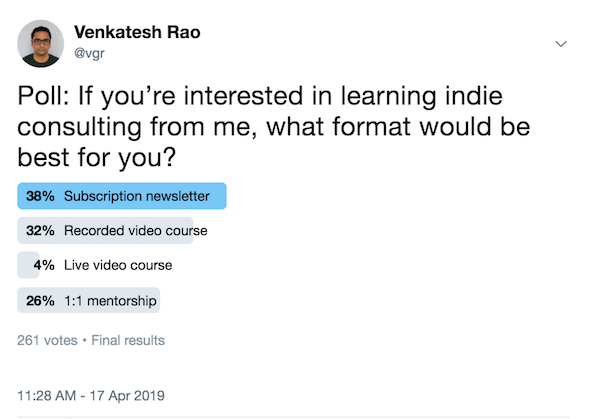Well, here we go. Figured I’d make my first real post a public one so I can say hello to both free and paid subscribers at once. As of this inaugural post, this list has 319 subscribers total, and 161 paying subscribers. It’ll take me a few warm-up issues to figure out how I want to divide ideas between public and subscriber-only.
For starters, I’m going to drop this conversation right into the deep end, with a list of 42 Great Truths of gig work in general, and indie consulting in particular. Niels Bohr defined a Great Truth as one whose negation is also a Great Truth. I’ve framed these as imperatives for your comfort and convenience, but the same principle applies. The opposite of every Great Imperative is also a Great Imperative.
If you like, give yourself 1 point for each of these that you either strongly agree with OR disagree with, based on your own experience, and 0 points if it seems like an arbitrary or theoretical concern that you have no strong experience-based feelings about. Deduct 1 point if you can’t even figure out what the hell I’m talking about with a particular point.
Your total score is a measure of your Capability Maturity Level as a consultant. If you score less than 10, don’t quit your day job. If you score less than 5, see a doctor to check if you are alive and over 18.
-
Do not accept work when broke that you would reject when flush
-
Say yes or no to gigs against your instincts 10% of the time
-
Never assign homework the client didn’t ask for
-
Never accept homework you didn’t ask for
-
Solve for industry level questions, not organization or world level answers
-
Choose hunting-party clients over individuals or impersonal organizations
-
Never accept a deliverable request from an intermediary who can’t act on it
-
Create choices, not recommendations
-
Keep your bespoke models as simple as possible
-
Only use off-the-shelf models that you enjoy nerding out over
-
Avoid making up vanity models
-
Do not participate in execution except in ceremonial forms (like talks)
-
Do not participate in risk where you can manipulate the reward
-
Avoid anchor clients
-
Avoid polished deliverables
-
Document through communication (such as email), not documents
-
The work ends when the story ends, not when the last check clears
-
Keep your private identity amusing to yourself
-
Keep your public identity a 10-foot-pole away from your gig work
-
Keep your client-facing identity normcore
-
Do not claim unambiguous value addition amidst ambiguous outcomes
-
Retrospectives of whole outcomes over personal value-addition estimates
-
No more than 7±2 active “cases” at a time (and that’s pushing it)
-
Train your memory to remember an hour of conversation without notes
-
Don’t trust your situation awareness in a gig after 6 months of inactivity
-
Learn what’s unique about the sector and its history
-
Learn the sector’s paper-napkin math and unique measures of itself
-
Demystify the industry’s science and technology stack for yourself
-
Discourage use of purely internal jargon in how clients talk to you
-
Keep the game in your head, not your head in the game
-
Design your personal incentives to remove moral hazard
-
Avoid sending unsolicited pitches
-
Cost-plus accounting over value-based accounting
-
If a client asks for an ROI estimate, walk away
-
Do not accept money the client cannot afford to spend
-
In billing, bundle and unbundle line items for at-a-glance auditability
-
Avoid retainers and advances unless the client needs to use them
-
Hourly rate over project or piece rate, project or piece rate over outcome-based
-
Learn more from every client than they learn from you
-
Learn to play obfuscated chess postman* across gigs, live
-
Generalize what you learn for public consumption, but not too soon
-
Never let the truth get in the way of a good story
Why is this the deep end? Because you won’t encounter the substance and reasoning behind these Great Imperatives until you’re a few years and a half-dozen clients into indie consulting. So some of these will seem theoretical and/or unnecessarily down in the weeds to you. Others will seem arbitrary or overly philosophical.
I’ve violated every single one of these in the last 8 years, some of them multiple times. But I’ve followed each rule more often than I’ve violated it, so they are my defaults.
What’s more, they’re neither idiosyncratic personal defaults, nor are they common-sense defaults that work well for everybody.
They are good defaults that undergird a particular philosophy and approach to indie consulting. They are the the bedrock of the school of consulting I’m founding that will last ten thousand years and evolve into a Holy Order of Space Consultants, and whose Original Immutable Esoteric Truths I will be sharing on this list with those who prove themselves worthy.
Though of course the actual list of Great Imperatives is subject to Great Edits.
If I had brainstormed this list 5 years ago, it would have been different. If I brainstorm it again in 5 years, it will be different. But the Original Immutable Esoteric soul of the list would remain the same, through such regenerations of the verbal body. And there will always be exactly 42 Great Imperatives. No more, no less. Why? See Great Imperative #42.
So welcome to the Art of Gig. I will try to do at least 1 public post a month. Paying subscribers, look out for the first subscriber-only post later this week.
*Basically, obfuscated chess postman is applying learnings from one gig to another in real-time, by creating suitable abstractions to port your new learnings without compromising confidentiality. The entire consulting industry is built around this.
